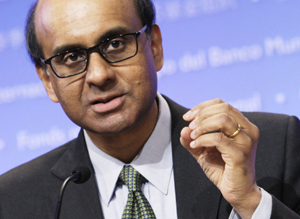New Delhi, Aug 26: Drawing attention to a high dropout rate in upper primary schools, Singapore Deputy Prime Minister Tharman Shanmugaratnam today said schools are facing the "biggest crisis" in India.
 Delivering the first lecture of government think-tank Niti Aayog's 'Transforming India' initiative, he said the world's second-most populous country also has the "biggest gap" in talent at the top and unfulfilled potential at bottom.
Delivering the first lecture of government think-tank Niti Aayog's 'Transforming India' initiative, he said the world's second-most populous country also has the "biggest gap" in talent at the top and unfulfilled potential at bottom.
Speaking on the need for social mobility, Shanmugaratnam said experiments have shown that starting as early as possible in a child's life cycle helps.
"Intervention at pre-natal stage are critical, followed up with pre-school opportunities," he said, adding that India has some notable schemes in this regard citing the results of the Integrated Child Development Services and Anganwadis.
Things, he added, can be achieved with village-level interventions -- from reaching out to the mother and the child as early as possible and then schools.
"Schools are the biggest crisis in India today and have been for a long time. Schools are the biggest gap between India and East Asia. And it is a crisis that cannot be justified," the Deputy Prime Minister of Singapore said.
Reeling off data, Shanmugaratnam said 43 per cent students drop out before finishing upper primary school. There is a shortage of 7,00,000 primary school teachers, only 53 per cent schools have girl's toilets and only 74 per cent have access to daily drinking water.
He went on to say this explains that when India took part in OECD PISA study in 2009, it was ranked 73rd out of 74 countries. "And this is in a country which has exceptional talent with people who go to IITs and IIMs and lead companies all over the world and are first-
rated," he added.
"India has the biggest gap, I know and I have spent many years in education... talent at the top and the unfulfilled potential of those in the rest of the society. And these things can be fixed. And it is not by way of ever-increasing budgets," he said.
Highlighting Singapore's example, the Deputy Prime Minister said it is not about spending more, but is about organisation and culture.
"How do we recruit our teachers, how do we train them, how do we hold the teachers accountable, how do we provide for quality across the system and not just at its most exclusive end? How do we ensure that every school is a good school?" he explained.
Shanmugaratnam saw a big challenge in the tertiary (higher) education system, which he said is not unique to India, but all over the world, the US, the UK, China, Europe and Korea.
"We are over-producing graduates who go through a general academic education. We have over-academised learning... We are producing students who do not have the skills required in the real world. We have to re-orient our system to focus on the skills required in the real world," he stressed.
On human resource development, Shanmugaratnam said: "Human capital development is not just what happens in first 12 years or 18 years of our life, it is about what happens to the life. It is about life-long learning. We need to refresh ourselves."
It means developing potential throughout life, having an infrastructure that encourages people to learn, he noted.
Shanmugaratnam also underscored "a very special role" cities play in Reform, Perform and Transform, particularly in a large continental-scale society like India. "Because it is cities which are crucibles of both innovation and inclusivity," he reasoned.
"It is in cities where you get a working relationship between government, business, ITIs and schools. We have to empower them. Hold them accountable, give them some financial autonomy and hold competition among them. Cities will play a special role in future," he predicted.
Shanmugaratnam endorsed Prime Minister Narendra Modi's policy, saying he has rightly emphasised that there is no strong economy and no strong nation without a strong society.
"And the social policies and the interaction between the social and economic policies have to be the primary arena for the government's ambition. Social policy at the end of the day is economic policy," he added.
He concluded saying the need of the hour is "what the Prime Minister emphasised in his speech". "It's not just about budgets, it's not just about programmes, it is at the end of the day about a social and political culture...," he added.
Shanmugaratnam underlined the need for enhancing social cohesion and the need to bring various sections of society together.
Making the point that looking long term in developing culture always pays, he said: "A culture that focuses on the long term is essential for all that we want to achieve in an inclusive society. Short-termism is an enemy of social mobility."





Comments
Add new comment